
The Best Dog Food for Senior Dogs
Kelly HoodAs dogs age, their nutritional needs shift, just like ours do. That tail-wagging energy might slow down a bit, joints may feel a little stiffer, and their digestive health can get more sensitive. That’s why finding the right senior dog food for your pup is one of the most important decisions you can make for his or her long-term health. At California Dog Kitchen, we believe that dogs deserve the same quality food we put on our own plates, and when it comes to senior dogs, that principle matters even more.
Whether your dog is entering its golden years with a full bounce in its step or needs a little more support, gently cooked, human-grade food packed with nutrients can make a big difference in how your dog feels every day.
Here are some of the best senior dog food options made with love, science, and organic ingredients from California Dog Kitchen.
Best 7 Dog Foods for Senior Dogs
When it comes to senior dogs, nutrition can make a world of difference in their comfort, energy, and overall health. The right food can support aging joints, ease digestion, improve cognition, and help them stay strong and active well into their golden years. Below are our top picks for the best dog food options for senior dogs – all made with human-grade ingredients and designed to meet their evolving needs.
1. Lamb & Squash Recipe
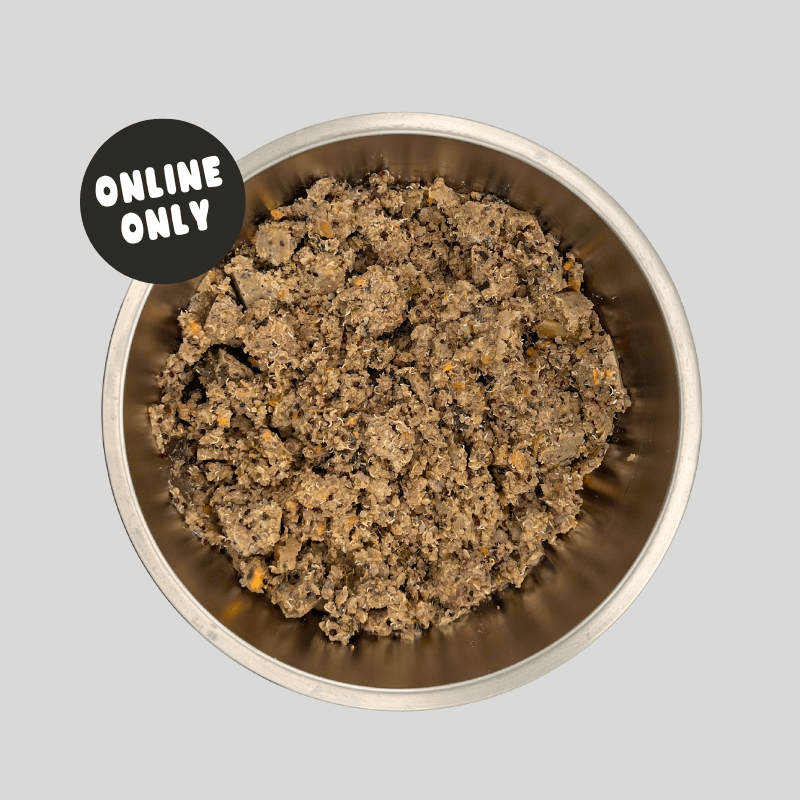
Made with Australian-raised lamb and organic squash, this recipe delivers high-quality protein and easy-to-digest veggies in every bite. The organic quinoa adds even more protein while soaking up the savory lamb flavor – a hit with picky eaters. Perfect for senior dogs who need clean, balanced nutrition without artificial fillers.
Why We Love It:
- High-protein formula supports muscle maintenance in older dogs.
- 98% of non-meat ingredients are USDA Certified Organic.
- Designed by a veterinary nutritionist.
- Gently cooked for optimal digestibility.
- No wheat, corn, soy, or preservatives.
Shop our Lamb & Squash Recipe today.
2. Beef & Quinoa Recipe
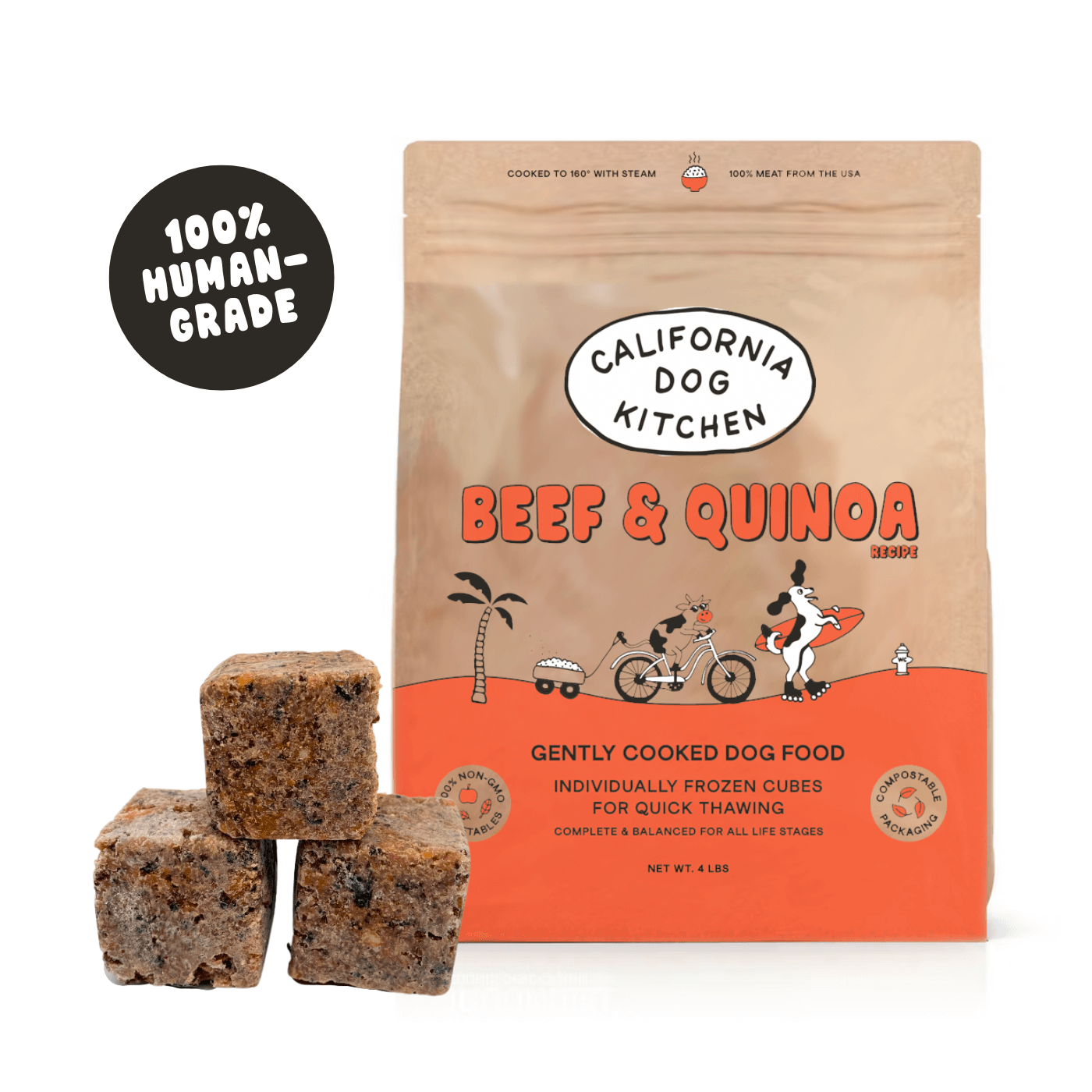
This USA-raised, USDA-inspected beef recipe is protein-packed and full of flavor. The organic quinoa adds a second source of complete protein and also turns this meal into one of the best senior dog foods for older dogs who’ve lost interest in their bowls. It’s balanced, hearty, and crafted to nourish your dog during his or her golden age.
Why We Love It:
- Made with 80/20 human-grade ground beef.
- Excellent option for picky senior dogs.
- USDA Certified Organic vegetables.
- No fillers or artificial preservatives.
- High-quality protein to support muscle mass.
Shop our Beef & Quinoa Recipe today.
3. Venison & Zucchini Recipe
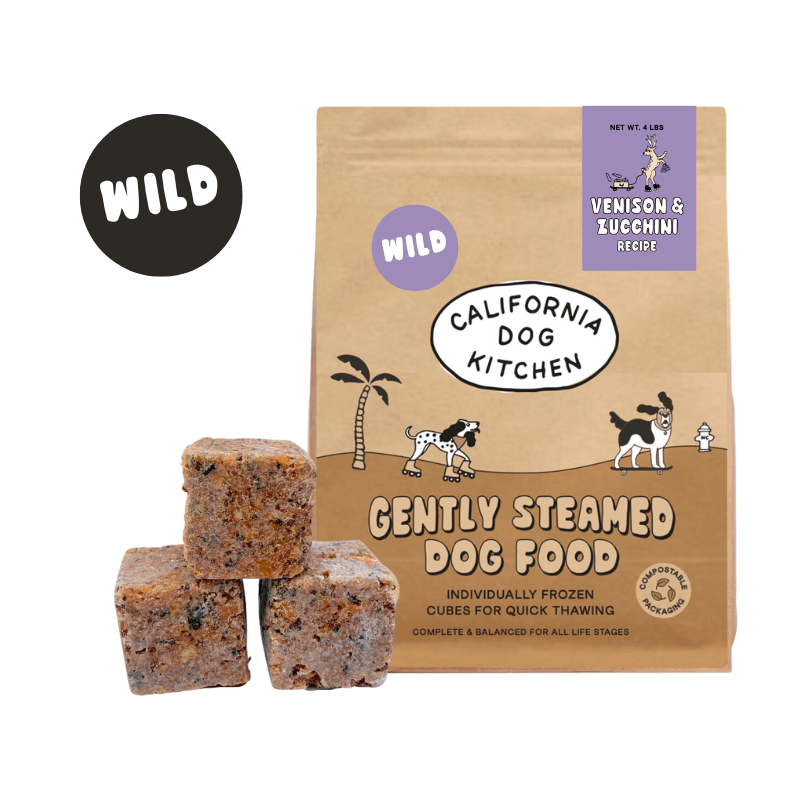
If your senior pup needs something a little leaner or has food sensitivities, this wild-hunted venison recipe is a game-changer. Venison is naturally low in fat and easy to digest, making it a great protein source for older dogs. Combined with organic veggies and quinoa, this recipe supports healthy digestion and balanced energy.
Why We Love It:
- Wild-hunted venison from Broken Arrow Ranch in Texas.
- Novel protein – ideal for sensitive stomachs.
- USDA Certified Organic vegetables and quinoa.
- High in protein, low in fat.
- No preservatives, wheat, corn, or soy.
Shop our Venison & Zucchini Recipe today.
4. Chicken & Rice Recipe
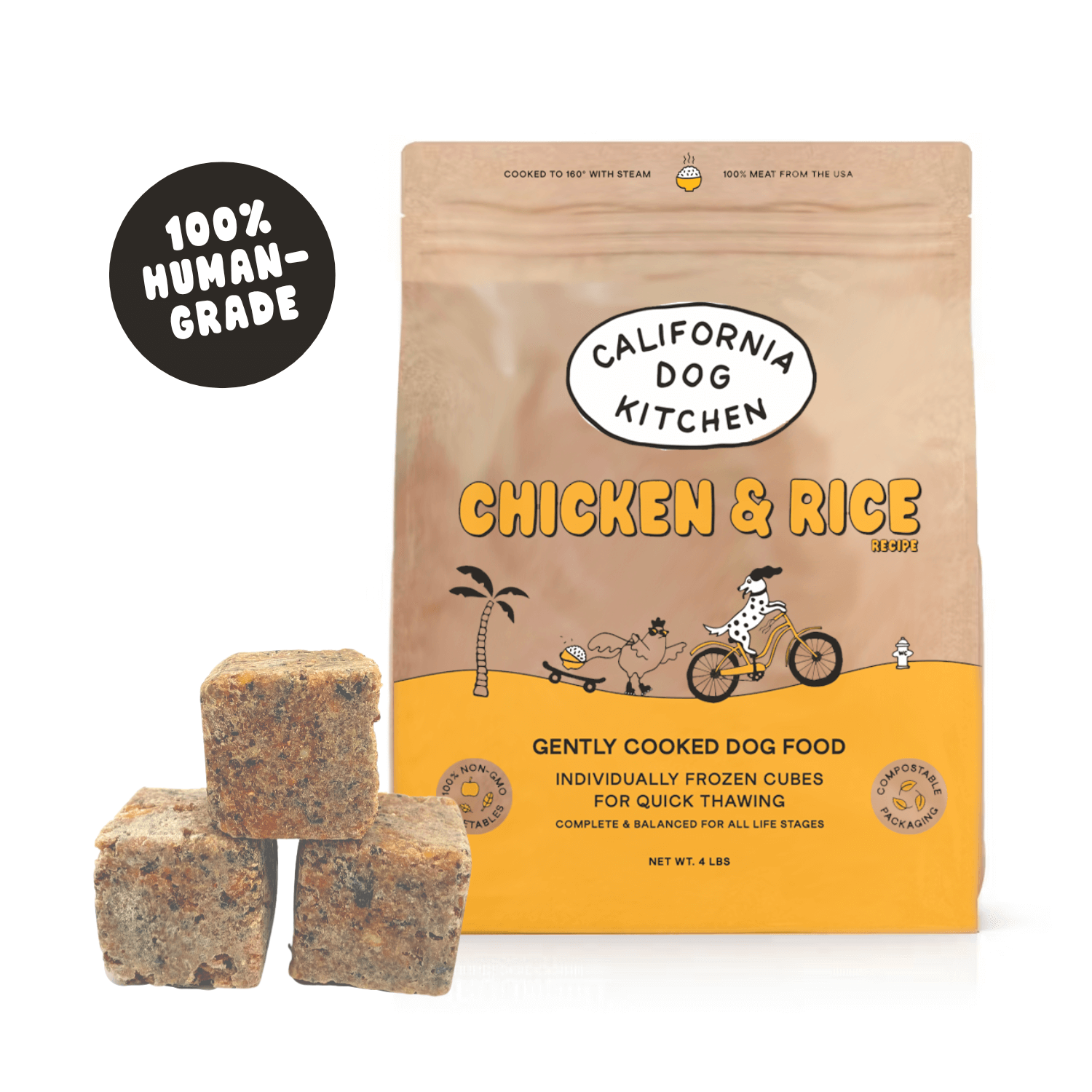
This classic combo is perfect for older dogs who need a simple, gentle formula. With USDA-inspected chicken and organic rice, this is our easiest-to-digest recipe. It’s especially great for senior pups who have gastrointestinal issues or tend to turn their noses up at other foods.
Why We Love It:
- Human-grade, hormone-free chicken.
- Highly digestible – perfect for sensitive tummies.
- Organic rice soaks up flavor and promotes satiety.
- Clean recipe free from common allergens.
- Lab-tested for complete nutrition.
Shop our Chicken & Rice Recipe today.
5. Organic Chicken Recipe
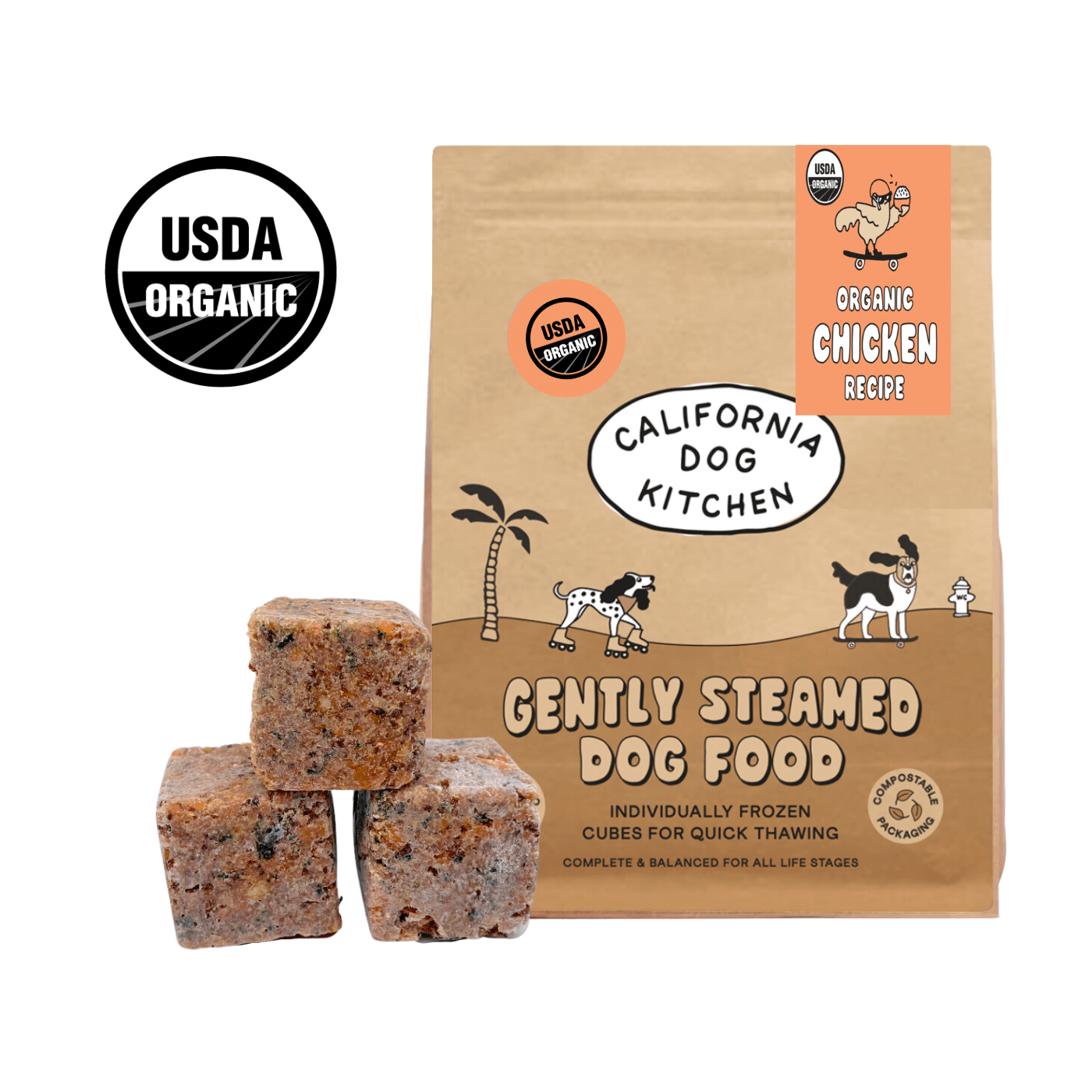
This USDA Certified organic gently cooked dog food is made with Mary’s Organic Chicken, raised right in Southern California. If you want the cleanest, most transparent option for your senior pup, this is it. Ideal for modern pet parents who value sustainability and ethical sourcing.
Why We Love It:
- USDA Certified Organic from start to finish.
- Mary’s GAP-certified (Global Animal Partnership) Organic Chicken (read more here).
- Fully traceable ingredients, clean kitchen protocols.
- No fumigants, harmful cleaners, or plastic packaging.
- Rich in protein, low in additives.
Shop our Organic Chicken Recipe today.
6. Grain-Free Turkey Recipe
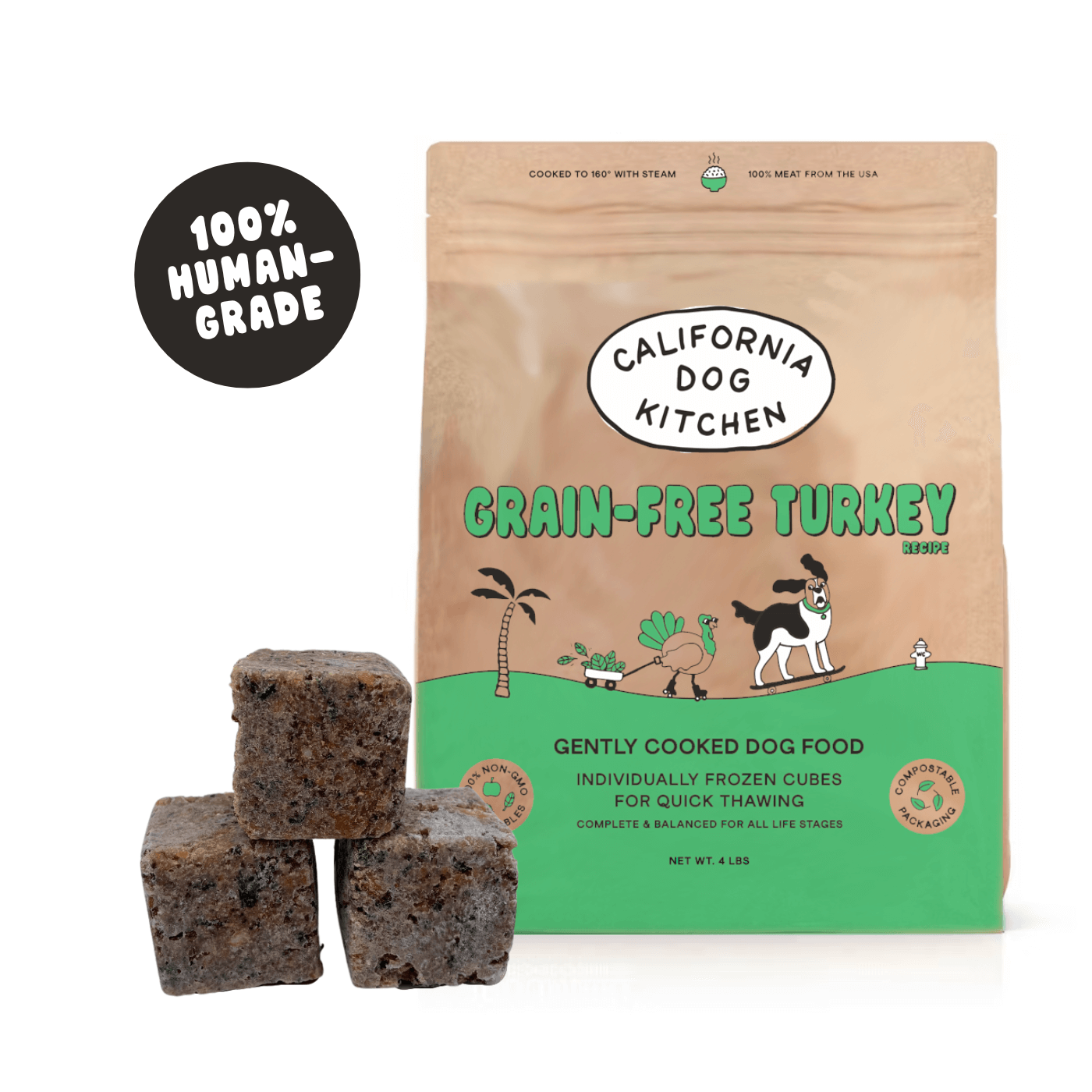
If your senior dog does better on a grain-free diet, this gently-cooked turkey formula is a great fit. It’s made from human-grade turkey, including organ meats, and organic vegetables. With about 65% turkey, it offers an excellent protein-to-veggie ratio without any grains.
Why We Love It:
- Grain-free, high-protein option.
- Includes nutrient-dense organ meats.
- Gentle on digestion and supportive of joint health.
- USDA Certified Organic produce.
- Made without preservatives or fillers.
Shop our Grain-Free Turkey Recipe today.
7. Grain-Free Fish Recipe
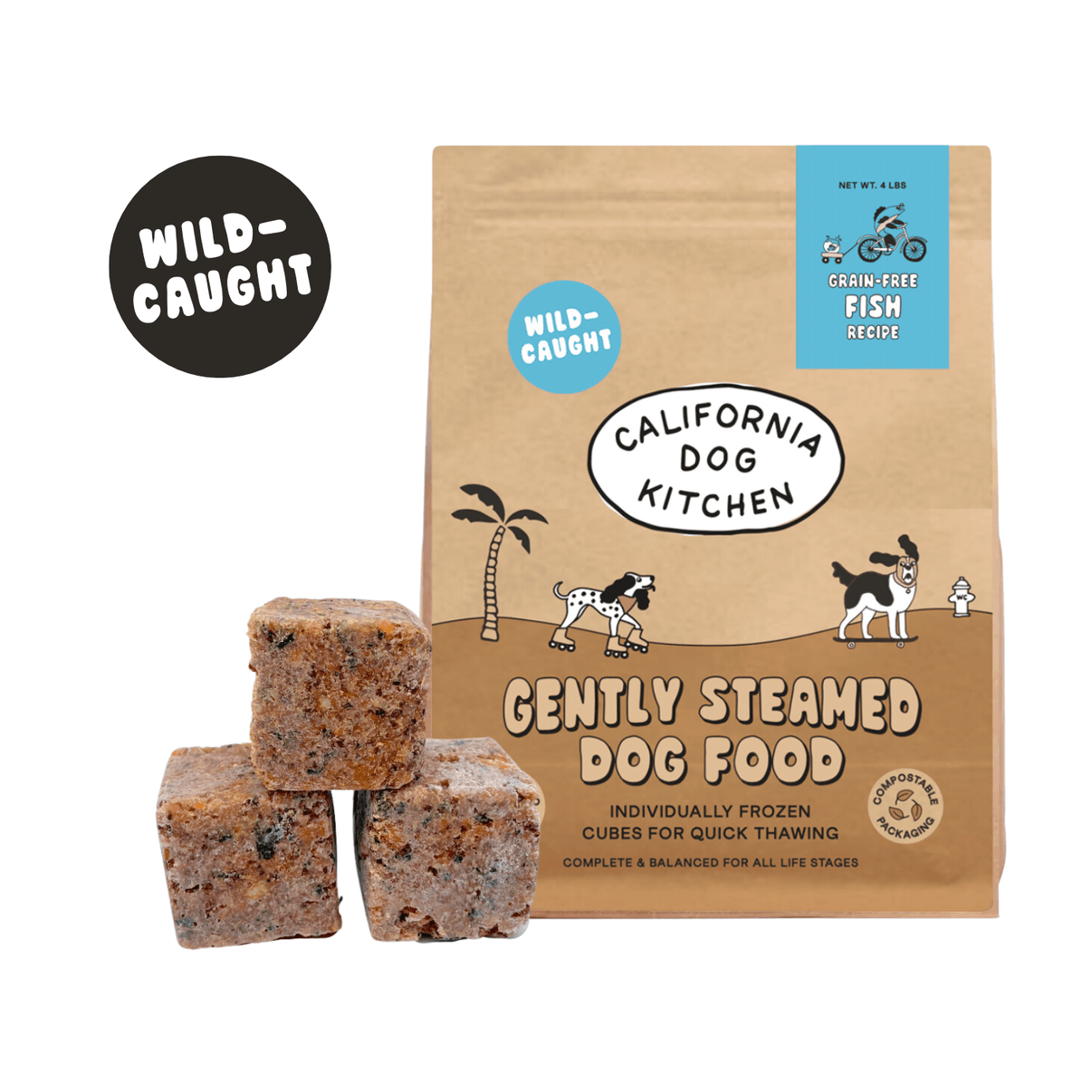
For dogs with allergies or mobility issues, fish can offer powerful benefits. This omega-3-rich recipe is made from wild-caught pollock and salmon skin – a fatty organ meat that’s great for your dog’s brain, coat, and joint health. If your senior dog has inflammation or skin issues, this recipe could provide real relief.
Why We Love It:
- Features two types of wild-caught fish.
- Rich in omega-3s to support aging joints.
- Grain-free and low-allergen.
- USDA Certified Organic vegetables.
- Steam-cooked for digestibility and food safety.
Shop our Grain-Free Fish Recipe today.
General Dog Care for Aging Dogs
As our dogs grow older, their care goes far beyond food, though nutrition lays the foundation. Supporting their health, mobility, and mental well-being requires a whole-body approach. By understanding and responding to their unique needs, we can help them enjoy a long, happy life by our side.
Here are some key areas to focus on:
1. Regular Vet Checkups
Senior dogs should see their veterinarian at least twice a year, even if they seem healthy. Older dogs are more prone to conditions like arthritis, kidney disease, diabetes, and cancer so early detection can make all the difference.
Ask your vet about:
- Blood work and urinalysis
- Dental exams
- Healthy weight monitoring
- Mobility assessments
Also, make sure your dog’s food is appropriate for any diagnosed conditions. California Dog Kitchen’s gently cooked meals are AAFCO-compliant for all life stages and formulated by a veterinary nutritionist, making them a trusted option to build around.
2. Daily Movement (At Their Pace)
Exercise is essential for senior dogs – it keeps joints lubricated, maintains muscle tone, and supports heart health. That said, the type and intensity of exercise should change with age.
Try:
- Short, multiple walks instead of one long one
- Swimming (great for low-impact cardio)
- Gentle indoor games or sniff walks
Avoid high-impact activities like intense running or jumping if your dog has arthritis or joint stiffness. Listen to their body language – if they’re slowing down, don’t push it.
3. Comfortable Living Spaces
Senior dogs spend more time resting, so their home environment should support that.
- Invest in an orthopedic bed to ease joint pressure.
- Use non-slip mats or rugs to prevent slipping on hard floors.
- Add pet stairs or ramps for getting on and off beds or couches.
- Make sure their food and water bowls are easy to access – raised bowls can help with arthritis.
These little changes can go a long way in enhancing their mobility and confidence.
4. Mental Stimulation and Emotional Wellness
Cognitive decline is common in aging dogs, but daily mental enrichment can help slow the process.
Ideas include:
- Food puzzles or treat-dispensing toys.
- Scent work or gentle hide-and-seek games.
- New environments (even just sniffing a different part of the neighborhood).
And don’t underestimate the importance of companionship. Senior dogs often crave closeness. If they’re more affectionate or clingy than before, it’s their way of staying connected.
Everything You Need to Know About Choosing Dog Food for Senior Dogs
When your adult dog hits its senior years, everything changes just a little – from how it naps to how it digests its dinner. They should even get new food. But with so many options on the shelves (and even more on the internet), figuring out the right nutrition plan can feel overwhelming.
You may come across other pet food manufacturers that promise balanced meals for older dogs, but not all are created equal. Some rely heavily on fillers or artificial preservatives, while others offer dry kibble that may be hard for dogs with dental or digestive issues. That’s why gently cooked meals with human-grade ingredients are often a better choice.
In this guide, we’re breaking down everything you need to know about feeding your senior dog, based on veterinary science, canine nutrition, and what we’ve learned from years of caring for aging pups. Whether your dog is slowing down, developing health conditions, or just needs a little extra TLC at mealtime, here’s how to make sure they’re eating a balanced diet that truly supports them through their golden years.

Understanding the Aging Process for Dogs
A dog’s age can sneak up on you. One minute they’re leaping onto the couch without a second thought, and the next, they’re pausing before a jump or sleeping a little longer each morning.
When is a dog considered a senior? While it varies by breed and size, most dogs are considered seniors around 7 years old. Larger breeds may reach this milestone even earlier, while smaller dogs can remain spry into their teens. But age is just a number – what matters is how their body is changing.
Here’s what tends to happen as dogs age:
- Slower metabolism: Older dogs burn fewer calories, even if they’re still active.
- Decreased lean muscle mass: Without enough protein, they can lose muscle quickly.
- Joint stiffness or arthritis: Inflammation becomes more common, and mobility can decline.
- Sensitive digestion: Aging digestive systems may not tolerate fillers or harsh ingredients.
- Dental health issues: Worn teeth or gum sensitivity can make chewing kibble uncomfortable.
- Picky appetites: Some senior dogs get fussier about food – texture and smell matter more.
These shifts mean they need a diet that’s gentle, nourishing, and tailored to meet their changing needs.
Nutritional Needs of Senior Dogs
Just like humans, dogs need a balanced diet as they age. Its body has to work harder to maintain itself, and poor nutrition can speed up the aging process or worsen chronic conditions.
High-Quality, Easily Digestible Protein: Senior dogs don’t need less protein – they need better protein. This crucial ingredient helps maintain muscle mass, supports immune function, and fuels energy levels. The key is choosing high-protein dog food that’s easy to digest, like gently cooked meats (not meat meal or mystery byproducts). All California Dog Kitchen recipes use human-grade, gently-cooked proteins like USDA-inspected beef, wild venison, and Mary’s Organic Chicken – exactly the kind of premium sources senior dogs need to stay strong. Many commercial dog foods use peas, legumes, and fillers in their ingredients, which can be hard for many pups to digest. Our pea free dog food is best suited for your dog's health and nutrition.
Healthy Fats for Brain and Joint Support: Senior dogs benefit from good fats, especially omega-3 fatty acids, which reduce inflammation and support cognitive health. These are naturally found in ingredients like salmon skin, pollock, and even turkey organs – all of which show up in California Dog Kitchen recipes.
Fiber and Gut Health: Digestive issues like constipation or loose stools are common in older dogs. That’s why fiber from organic vegetables like squash, zucchini, and spinach plays such an important role. It keeps digestion smooth and feeds beneficial gut bacteria.
Antioxidants and Micronutrients: Senior dogs are more prone to oxidative stress, which can contribute to conditions like cancer, poor joint health, heart disease, and cognitive decline. Antioxidant-rich veggies and fruits like kale and blueberries can help reduce this risk. California Dog Kitchen uses organic, whole ingredients with minimal synthetic supplementation, focusing on food-based nutrients.
Low or No Fillers: Senior dogs simply can’t afford to waste calories on corn, wheat, soy, or artificial fillers. These ingredients add zero nutritional value and can also irritate aging guts. Every California Dog Kitchen recipe eliminates those entirely, which is what sets their diets apart from other dog food brands that rely on low-cost filler ingredients to bulk up their formulas.

Health Considerations When Choosing The Best Food for Senior Dogs
Feeding a senior dog well isn’t just about healthy weight or easing digestion. Food becomes an important tool in managing common age-related health concerns. The right diet can help you reduce your dog’s discomfort, improve mood, and possibly even extend its lifespan.
Here’s what to look for based on common senior dog health challenges:
- Arthritis and Joint Stiffness: A diet rich in anti-inflammatory omega-3 fatty acids (like those found in salmon and pollock) can help ease joint pain. Grain-free fish-based recipes or turkey with organ meats are particularly beneficial.
- Kidney Function: Many people mistakenly believe senior dogs should be on low-protein diets to “protect” the kidneys. Unless your vet recommends a kidney health-specific diet for a diagnosed condition, senior dogs need moderate, high-quality protein for muscle mass, not reduced protein. All California Dog Kitchen recipes are AAFCO-formulated for balanced nutrition, including renal-friendly moisture content and low-sodium formulations. Always be sure your dog has ample fresh water for overall hydration and to give the kidneys a boost.
- Weight Management: Both underweight and overweight seniors need special attention. Recipes like Beef & Quinoa offer rich flavor and calories for underweight dogs, while leaner options like Venison & Zucchini or Chicken & Rice provide balanced meals for dogs who need to shed a little weight without missing nutrients.
- Cognitive Decline: Older dogs can experience something akin to dementia, called canine cognitive dysfunction. Diets high in antioxidants and omega-3 fatty acids can support brain health. Fish-based recipes or anything with wild meats and organic greens can be particularly beneficial.
- Food Sensitivities or Allergies: Some dogs develop sensitivities later in life, even to foods they’ve eaten for years. Novel proteins like venison or organic chicken are often tolerated better. California Dog Kitchen’s use of limited, whole-food ingredients makes it easier to isolate and avoid problem foods. Our chicken free dog food is perfect for dogs with sensitivities and allergies or those that prefer alternative proteins.
- Appetite Loss or Picky Eating: A gently cooked, fresh food diet is often the best solution for dogs who refuse to eat. The rich aroma and natural taste of real meat, cooked in small batches, gives more health benefits than dry kibble.
Frequently Asked Questions
What is the Healthiest Dog Food for Senior Dogs?
The healthiest food is one made with human-grade ingredients, gently cooked meats, organic vegetables, and no fillers or preservatives. California Dog Kitchen’s recipes – like the Grain-Free Fish or Organic Chicken – are excellent choices because they prioritize quality, digestibility, and nutrient balance.
What to Feed My 13-Year-Old Dog?
Start with gently cooked food that’s easy to chew and rich in real protein. Many 13-year old dogs do well on Chicken & Rice if they need something gentle, or Venison & Zucchini if they need a lower-fat, allergy-friendly meal. Make sure your senior dog food nutrients are balanced, which is the case in all California Dog Kitchen recipes.
What Can I Feed My Senior Dog to Gain Weight?
If your senior pup is underweight, try Beef & Quinoa or Lamb & Squash – both are high-protein and highly palatable. Gently cooked meals are easier to digest, which helps your dog absorb more nutrients. Make sure your vet has ruled out underlying causes like dental pain or illness.
Is Dry Food Better for Senior Dogs?
Not at all. In fact, dry food can be too harsh for older dogs, especially those with dental issues or digestive health problems. Gently cooked, fresh food is easier on their stomach and more appealing to eat. It also provides better hydration, which is important for kidney and urinary health. Many dog owners go for wet food for this reason.
What Food is Easy to Digest for Senior Dogs?
Foods like Chicken & Rice, Organic Chicken, and Grain-Free Turkey are all easy on the stomach. Look for senior dog food recipes with gently cooked meat, organic veggies, and no preservatives or by-products. Avoid artificial flavors, wheat, and corn.
Conclusion
Feeding your senior dog the right food is one of the most impactful things you can do for his or her health, comfort, and happiness. As our dogs age, they need more than just calories – they need carefully chosen ingredients that support everything from joint function to digestive health to cognition.
At California Dog Kitchen, we don’t believe in compromises. Our senior dog food formula is crafted with the same level of care and quality that we’d want for ourselves, because our dogs are family. That means:
- Real, human-grade meats
- Organic veggies and grains
- No preservatives, fillers, or mystery ingredients
- Meals designed by veterinary nutritionists for senior dogs
We've got a recipe that’s just right for your dog, whether they need a gentle reset or a nutrition-packed meal.
If your best friend is heading into his or her golden years, now’s the time to switch to a diet that reflects how much you love them. Because when it comes to our dogs, fresh food isn’t a luxury – it’s what they deserve. Shop California Dog Kitchen today.
